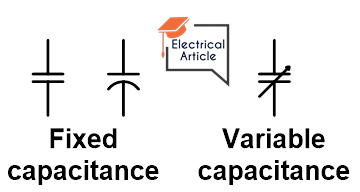The capacitor is a passive electronic component with two terminals. It is a device that stores electrical energy in the form of an electric field. A capacitor is one of the widely used electronics components in various electronic circuits.
The capacitor is an energy storing element and
this potential of storing a charge is known as capacitance. The value of the capacitor
is specified in terms of capacitance.
All capacitors consist of two parallel conducting
plates. These plates are separated by an insulating material. And these
insulating materials are known as a dielectric.
Types of Dielectric Materials
Dielectric materials used for capacitors can be grouped into the following main classes.
- Mica, glass, ceramic
- High permittivity ceramic
- Paper and metalized paper
- Electrolytic: Oxide film, tantalum
- Dielectrics such as polystyrene, polythene polytetrafluoroethylene
Reactance of Capacitor
A capacitor tries to oppose the flow of
current in the AC circuits. The ability to oppose the flow of current is known
as capacitive reactance. The reactance of a capacitor is denoted by Xc and its
expression is given by,
Xc = 1/(2πfC)
From the above equation, we can say that
the capacitive reactance is inversely proportional to the frequency. Therefore,
the reactance decreases with an increase in frequency.
Capacitance
The amount of charge required to develop a
1 Volt potential difference between its plates is known as capacitance. And the
unit of capacitance is Farad (F).
The Capacitance the ratio of charge 'Q' to the
voltage 'V' and expressed as
C = Q/C
Now if, Q = I Coulomb, V = 1 Volt and C = 1
Farad
The capacitance of a parallel plate capacitor
is given by,
C = ε (A/d)
Where,
ε = Permittivity,
A = Area of each plate and
d = Separation between the plates
According to the above equation, the
capacitance is directly proportional to the permittivity and area of each
plate. And it is inversely proportional to the separation between plates.
The above figure shows the symbols of fixed
and variable capacitors.
Units of Capacitance
Capacitance is measured in Farads (F). But
Farad is a very large unit. So, smaller values are expressed in terms of microfarad
(μF) or nano farad (nF). In some electric circuits, it is also defined
in terms of picofarad (pF).
1 microfarad = 1x10-6 farad
1 nenofarad = 1x10-9 farad
1 picofarad = 1x10-12 farad





0 Comments